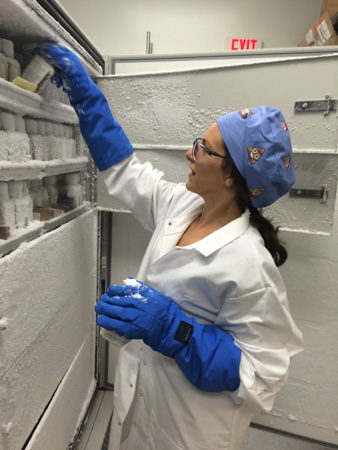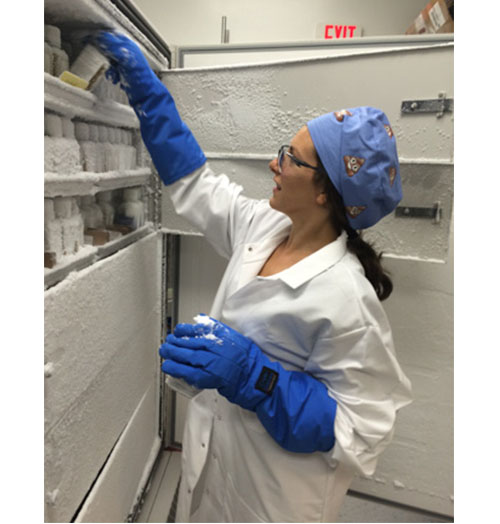 Last week, I wrote about using the OpenBiome donor stool product and how much easier it makes it do perform a fecal transplant (FMT) for C. difficile infections. This week, I’d like to examine how the frozen stool compares to the fresh stuff in terms of treating the C. diff infection. The comparison (weirdly enough) reminds me of my Italian aunt, an excellent cook, who made a mean pesto sauce from fresh basil, olive oil, garlic, cheese, pignoli nuts, salt, and love. Steak and pasta with pesto was a classic summertime meal and the flavors still remind me of my childhood. Well one day many years ago she was raving after tasting some premade pesto sauce from the local grocery store, and proclaimed she’s through with making pesto from scratch anymore…”it just doesn’t pay to make it yourself!” We all knew that her homemade sauce was better than the food store pesto, but was it that much better to justify my aunt spending fifteen dollars on ingredients, ten minutes to make the sauce, and another ten minutes to wash the food processor and all the utensils needed just to make 8-oz. of the green stuff? Well, I kind of feel the same way about using this frozen stool. No self-respecting gastroenterologist would use premade stool, just like no self-respecting Italian would use jarred sauce, right?
Last week, I wrote about using the OpenBiome donor stool product and how much easier it makes it do perform a fecal transplant (FMT) for C. difficile infections. This week, I’d like to examine how the frozen stool compares to the fresh stuff in terms of treating the C. diff infection. The comparison (weirdly enough) reminds me of my Italian aunt, an excellent cook, who made a mean pesto sauce from fresh basil, olive oil, garlic, cheese, pignoli nuts, salt, and love. Steak and pasta with pesto was a classic summertime meal and the flavors still remind me of my childhood. Well one day many years ago she was raving after tasting some premade pesto sauce from the local grocery store, and proclaimed she’s through with making pesto from scratch anymore…”it just doesn’t pay to make it yourself!” We all knew that her homemade sauce was better than the food store pesto, but was it that much better to justify my aunt spending fifteen dollars on ingredients, ten minutes to make the sauce, and another ten minutes to wash the food processor and all the utensils needed just to make 8-oz. of the green stuff? Well, I kind of feel the same way about using this frozen stool. No self-respecting gastroenterologist would use premade stool, just like no self-respecting Italian would use jarred sauce, right?
Sorry about that analogy…hopefully you can still enjoy pesto sauce without thinking of all this other stuff in the future! But the question is valid: How much of a difference in outcome are you willing to accept when using frozen stool (when compared to fresh stool) for the sake of convenience?

Image: OpenBiome
To answer this question, we go to the literature: Frozen oral capsules have been used to perform fecal transplant with success, and in a small study of 20 patients, there was a reported 70% treatment effect (resolution of diarrhea symptoms) with the first treatment of the oral “poop pills.” If the non-responders were then retreated, the overall success rate increased to 90%. So it appears that frozen stool still carries most of the benefits of fresh stool, at least in this small study. More relevant to the way FMT is usually done in practice, there was a larger study presented as an abstract in October 2016 that used frozen donor stool from a stool bank delivered via colonoscopy for patients with C. difficile colitis. Among 1322 patients with recurrent C. difficile, an 87% clinical cure rate was reported by using 250-mL of previously-frozen donor stool. It is not clear from the abstract if this 87% cure refers to the first treatment, or if non-responders were retreated and factored into this figure. If this 87% was the cure from the first treatment alone, this would be on-par with the clinical cure rate seen from fresh donor stool, and would mean that frozen stool would be just as good as fresh, and a lot less messy! The only caveat of this study is the fact that most of the authors are employees of OpenBiome, the company that produces the frozen donor stool. Nonetheless, commercially-available frozen donor stool seems like an excellent alternative to making the real thing yourself…it just might “not pay” to do it the old fashioned way anymore!
